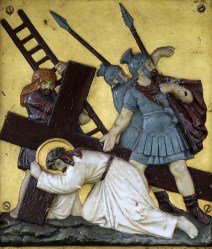When I was a college professor, students often asked me questions. Some began by saying, “This may be a stupid question.” For many years, my stock response was, “There are no stupid questions.” But after a while, it dawned on me that I was wrong about this. There are stupid questions. There are also disingenuous questions. Some are traps, and many are merely dead ends. We are better off leaving some questions unanswered. Others should not even be raised. Satan deconstructed Eve’s faith with a question. According to Genesis 3:1, he said, “Did God really say, ‘You must not eat from any tree in the garden’?”
On the surface, it sounds reasonable. Did or did not God say such a thing? Theologian Geerhardus Vos notes that the process of Satan’s temptation of Eve unfolds in two stages. “In both the central purpose of the tempter is the injection of doubt into the woman’s mind,” he explains. “But the doubt suggested in the first stage is of an apparently innocent kind, a doubt as to the question of fact.”[1]

In a way, it is a wonder that Satan would even ask such a question of Eve. Normally, paying attention to what God has said is the first step in avoiding sin. However, this innocent-sounding question was a weapon fueled by malice and barbed with slanderous innuendo against God. Eve sensed the challenge implied in Satan’s query, and her initial response was defensive. She pointed out that the boundaries set by God were generous, with the restriction limited to only one tree. “We may eat fruit from the trees in the garden,” she said, “but God did say, ‘You must not eat fruit from the tree that is in the middle of the garden, and you must not touch it, or you will die’” (Gen. 3:3).
Many commentators believe she unnecessarily exaggerated God’s command by adding the stipulation, “you must not touch it.”[2] It is possible that these words accurately reflect the prohibitive force of God’s command. If the fruit was dangerous to eat, it was dangerous to touch. What other reason would one have for touching the fruit but to consume it? In her case, touching was the first concrete action on the path of disobedience. In Leviticus, prohibitions against eating unclean foods were sometimes strengthened by a parallel warning not to touch (Lev. 7:21; 11:8, 24, 26, 27, 31).
After Eve had clarified the boundaries God set, Satan threw off the veiled cloak of innuendo. The hidden accusation of his question came into full view. “‘You will not certainly die,’ the serpent said to the woman. ‘For God knows that when you eat from it your eyes will be opened, and you will be like God, knowing good and evil’” (Gen. 3:4-5). The bait was cast and the hook set. Instead of dismissing Satan outright, Eve concentrated her full attention on what was forbidden. Genesis 3:6 says that she “saw that the fruit of the tree was good for food and pleasing to the eye, and also desirable for gaining wisdom.”
What’s So Good About It?
This summary echoes the litany the writer has used after each creative act. “God saw that it was good” (Gen. 1:10, 12, 18, 21). That assertion was strengthened further when the Lord placed his imprimatur on the whole. “God saw all that he had made, and it was very good” (Gen. 1:31). That the forbidden tree was included in this “all” is something of a shock. Would God really create something that is appealing, but whose ultimate effect is destruction, and then call it good? Scripture says that he did.

What did the Lord mean by good? “‘Goodness’ has something to do with the realization of God’s will and intentions,” Michelle Knight has observed.[3] Knight points out that God’s evaluation is more than a statement; it is a perception. God “saw” that it was good.[4] The forbidden tree was good, but for what? “God’s express directive (2:16-17) clarified, at minimum, that this tree was not good for humans to eat,” Knight explains further. “Eve’s transgression was to make a judgment about the tree’s purposes and benefits according to her own perspective and counter to YHWH’s.”[5]
The mere fact that the tree was visually appealing did not mean that its fruit was “good for food.” It was good for testing. Eve agreed with God’s overall assessment that the tree was good. Unfortunately, Satan’s bald-faced lie about the consequences of eating had distorted her perception. Eve was not ignorant, but she was deceived. She knew that the tree was forbidden and had been warned that eating its fruit would be deadly. Nevertheless, she rejected what she knew and chose to believe a different narrative because she preferred the lie.
Naked Self-Interest
It may seem as if I am laying all the blame for the fall of humanity upon Eve. This is not the case. The apostle does call Eve a “sinner” or “transgressor” in 1 Timothy 2:14, but he uses the same word in Romans 5:14 to speak of Adam’s disobedience. The main difference was that Eve had been blinded by deceit, while Adam sinned with his eyes wide open. If anything, Adam’s culpability was greater, since sin entered the world through him (Rom. 5:12).
Satan had promised that Adam and Eve would “be like God” (Gen. 3:7). Instead, “they realized they were naked” (Gen. 3:8). Far from obtaining transcendent knowledge, they discovered shame. They made coverings for themselves and hid among the trees. According to Genesis 3:9, the Lord called out to Adam, saying, “Where are you?” Adam’s reply seems childishly simple. “I heard you in the garden, and I was afraid because I was naked; so I hid” (Gen. 3:10).
The Lord’s next two questions follow in quick succession, as the second provides the answer to the first. “Who told you that you were naked?” the Lord demands. “Have you eaten from the tree that I commanded you not to eat from?” Adam’s defense begins to lay bare the damage that has been done. Eating the forbidden fruit made him self-conscious in the presence of God. It has also created a rift between Adam and his wife. Adam had called Eve “bone of my bone” and “flesh of my flesh” (Gen. 2:22). Now he refers to her as “the woman you put here with me” (Gen. 3:12). It sounds as though she were, if not an intruder, at least an imposition.
Questions That Hurt & Heal
Not every question is a good one, but they are not all bad either. Questions can heal as well as hurt. The Lord approached Adam with a question. Douglas Estes has called the ability to ask questions a distinctly human trait. Estes notes that animals can signal, gesture, and vocalize, “But animals lack the metacognition to question.”[6] Those who have tried to stare down their pet dog might challenge this. But when Estes speaks of a question, he is not talking about mere puzzlement or even appeal. “My cat, Sitka, can tell me he needs food (‘meow’), and command me to get him food (‘meow, meow, meow), but he cannot ask me what food is,” Estes explains. Questioning involves abstract thought that explores possibilities and the ability to think about thinking.[7]

Divine questions are prominent throughout Scripture. They do more than seek information. In the Genesis account, both Satan and the Lord ask questions whose answers they already know. Yet, with radically different aims. Satan’s question was meant to drive a wedge into Eve’s faith and undermine her confidence in God.
The Lord, on the other hand, asked a string of questions for a markedly different reason. His first question sounds like he is seeking information. But its real purpose was to draw Adam and Eve out of hiding. It amounts to an invitation. The questions that followed this were designed to elicit confession, the first step in closing the distance. The Lord did not use questions to drive Adam and Eve away. But to draw them in and redeem.
Jesus the Interrogator
Jesus employed questions to instruct his followers and foil his enemies. This method of speaking was part of a larger pattern of communication that Bruce Reichenbach describes as “ambiguous rhetoric.”[8] It included double meaning, irony, riddles, sarcasm, symbols, and unanswered questions. Jesus raised questions that he did not answer (at least directly). He also asked questions that his hearers were unable or unwilling to answer. The purpose of his questions often depended upon the situation and the recipient.
Still, there are some questions that it is better not to ask. These are often questions that arise within our own hearts. Satan’s ultimate aim in questioning Eve was not to elicit an answer. He meant to sow doubts that would prompt her to ask the wrong question. Satan’s goal was to deconstruct her faith.
Lately, it has become rather fashionable to describe oneself as a deconstructionist. Many people of faith do not feel equipped to defend against deconstructionism. They have not read the works of Hegel, Heidegger, or Nietzsche. Even if they did, they are not confident that they would understand them. Deconstruction is an ethos as much as an argument. Its fundamental question is the same one that was posed to Eve: “Did God really say…?”

Positive Deconstruction
Yet deconstruction does have a place. In most cases, the gospel tears down before it builds up. “We demolish arguments and every pretension that sets itself up against the knowledge of God, and we take captive every thought to make it obedient to Christ,” the apostle Paul declared in 2 Corinthians 10:5.
In this context, he makes it clear that there is both spiritual and intellectual work involved in this task. There are forces in play as well as ideas. “The weapons we fight with are not the weapons of the world,” he points out. “On the contrary, they have divine power to demolish strongholds” (2 Cor. 10:4). Paul’s words are a sharp reminder that all Scripture truth reflects a fundamental binary. It is the one we find already under attack in Eden. God has said this and not that. He means this and not that. God expects this from us, not that.
Ask Better Questions
If we deconstruct Satan’s question, we find a better question. What, exactly, has God said? This is the cornerstone of all biblical understanding. Once posed, this question invites three others. To whom did God say it? Why did he record this? And, finally, what implication does this have for me?
Together, these four questions form the boundaries of interpretation. Each is expansive. Other questions arise out of them. Not all ancillary questions are worth answering. Some questions are vain. They lead to unprofitable tangents and seek answers that are impossible to know. Others are evasions that distract us from unwelcome truths. Quite a few are premature. We have not yet understood the text enough to raise them.
The observation C. S. Lewis made about those passing moods that tend toward doubt also holds true for some of our questions.[9] Very often we need to tell our questions “where they get off.” Not every question is a good one. There really is such a thing as a stupid question. There are also disingenuous questions. Some are traps, and many are merely dead ends. Some questions do not deserve an answer, and others should not even be asked. Most think that wisdom is a matter of knowing the answers. But any true sage can tell you that the real key is knowing what to ask.
[1] Geerhardus Vos, Biblical Theology: Old and New Testament (Grand Rapids: Eerdmans, 1948), 35.
[2] For example, Old Testament scholar Derek Kidner has called this an over-correction “magnifying God’s strictness.” Derek Kidner, Genesis (Downers Grove: InterVarsity, 1967), 68.
[3] Michelle E. Knight, “‘God Saw That It Was Tov’: Divine Assessment and the Goodness of Creation,” Trinity Journal, 44, no. 1 (2023): 5.
[4] Ibid., 6.
[5] Ibid., 8.
[6] Douglas Estes, “The Linguistic Origins of the Question: Why God Asks Questions and Humans Do Too,” Christianity Today 61, no. 7 (2017): 65.
[7] Ibid.
[8] Bruce R. Reichenbach, “Why Does Jesus Use Ambiguous Rhetoric?” Bibliotheca Sacra 180, no. 718 (2023): 179–201.
[9] C. S. Lewis, Mere Christianity (New York: HarperOne, ), 141.











































































































You must be logged in to post a comment.